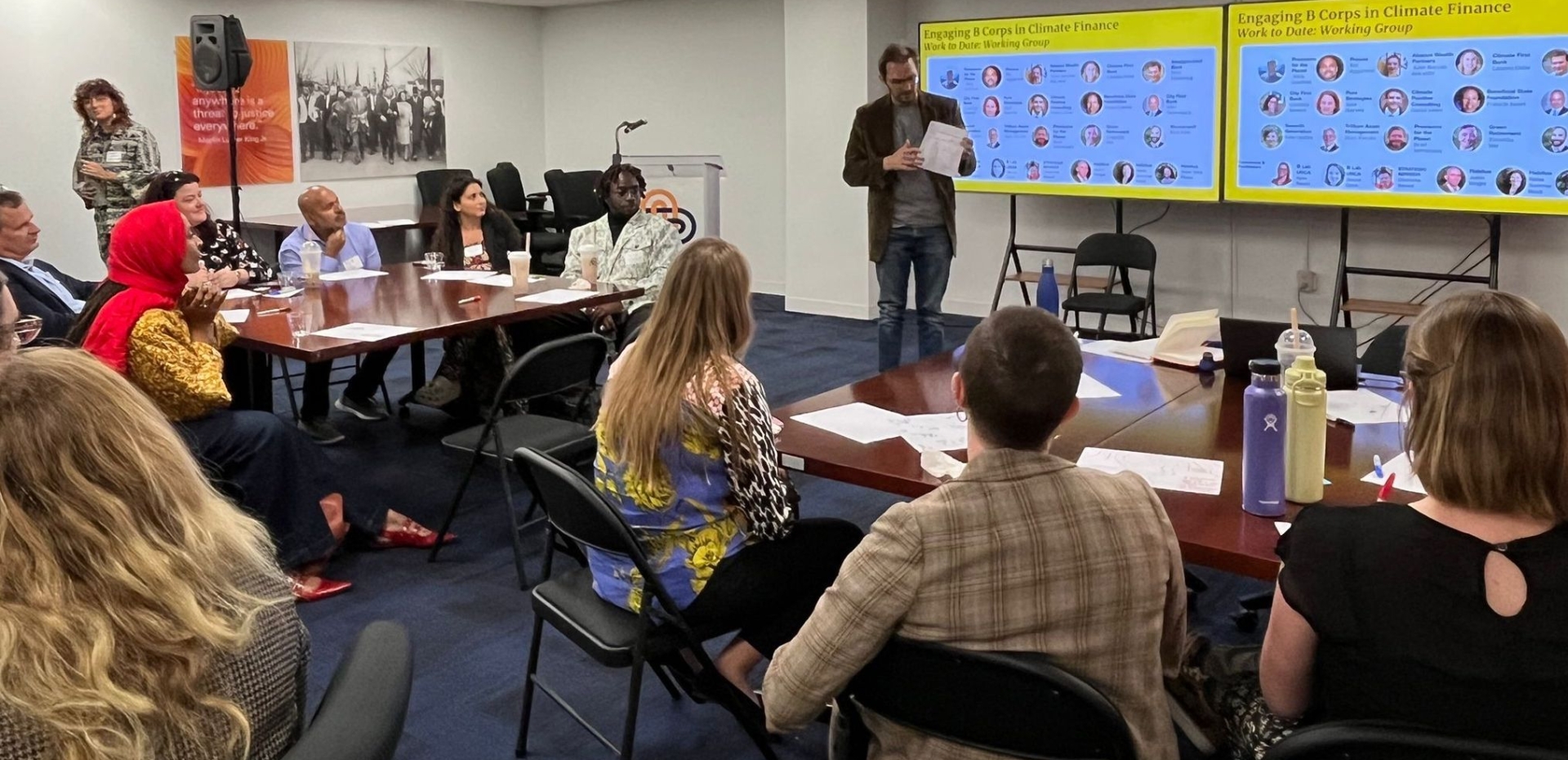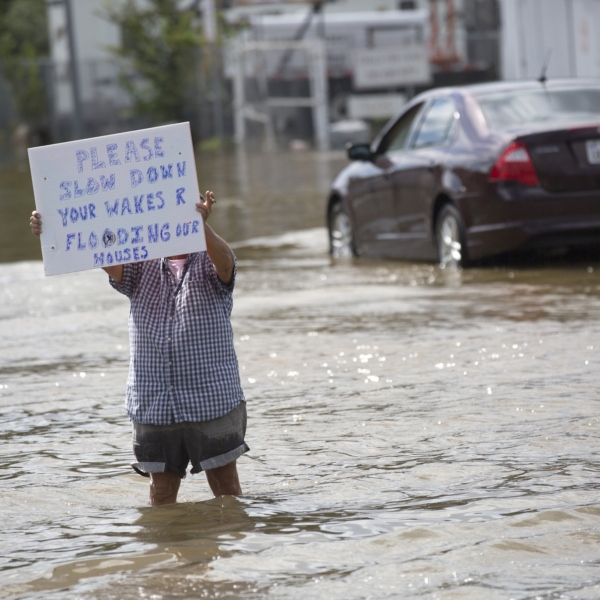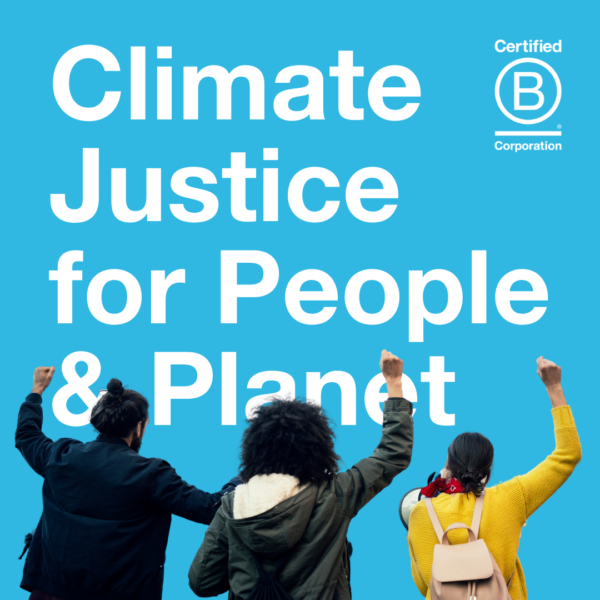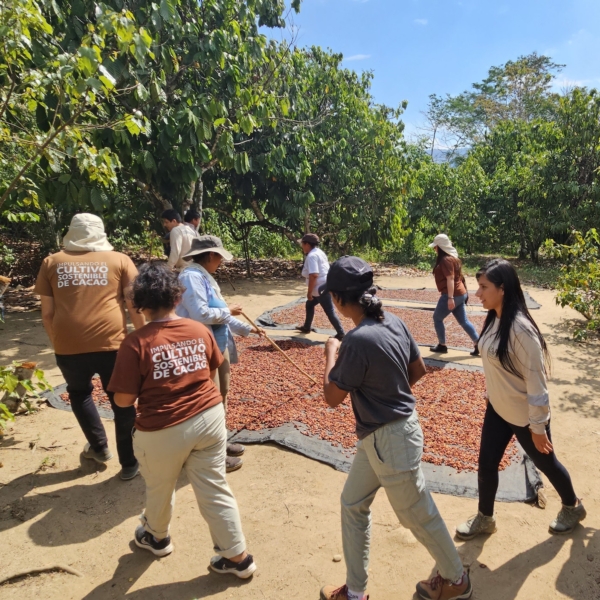Advancing Climate Justice Through Business Finance and Community Collaboration
October 10, 2024
On-the-Ground Highlights from Climate Week NYC 2024 and the Launch of B Lab U.S. & Canada’s Business Climate Finance Resource Guide
This article is a personal perspective from an employee at B Lab, the nonprofit behind Certified B Corporations. In this series, we invite B Lab employees to share their experiences, inspiration, hopes, and challenges as they work toward a more inclusive and regenerative world. This edition of B Lab Voices is from Kylie Nealis, Senior Program Manager for Climate Justice at B Lab U.S. & Canada. It includes contributions from Clementina Consens, Senior Associate, Climate Justice at B Lab U.S. & Canada, as well as Raj Aggarwal, CEO of Provoc, and Charlotte Sewell, who are strategic advisors to B Lab U.S. & Canada’s Climate Justice Program.
Editor’s note: Follow B Lab U.S. & Canada on LinkedIn for information and resources from partners and B Corps on the ground on how to support in the aftermath of Hurricanes Helene and Milton.
If you’ve been to Climate Week NYC before (or any other whirlwind conference or large gathering), you know that it tends to be fast-paced and outright overwhelming at times. In my second year of attending, I saw clearly how Climate Week NYC serves as an annual hub for irreplaceable in-person connections, a deep well of knowledge and insights around climate action and solutions, and a catalyst for impactful collaborations in the months and years to come.
It’s also evident that the climate crisis continues to be the single biggest threat to our collective humanity and the Earth’s future. We’re seeing this in climate disasters around the world and, more recently, close to home. Since Climate Week wrapped up, we have witnessed the deadly and destructive Hurricane Helene ravage the Southeast U.S., resulting in hundreds of lives lost, now followed by Hurricane Milton, among the strongest hurricanes to strike Florida. Scientists are telling us that climate change is making these disasters worse. It’s also more clear than ever in the face of both of these disasters that the impacts are disproportionately affecting People of Color and marginalized communities who experience higher mortality rates due to natural disasters and extreme weather events.
Business climate action focused on justice and equity has never been more crucial. With collaboration, inclusion, equity, and positive social and environmental impact as core values, Certified B Corporations are uniquely positioned to advance climate justice by centering the needs and voices of those who are most impacted by climate change in their climate action efforts.
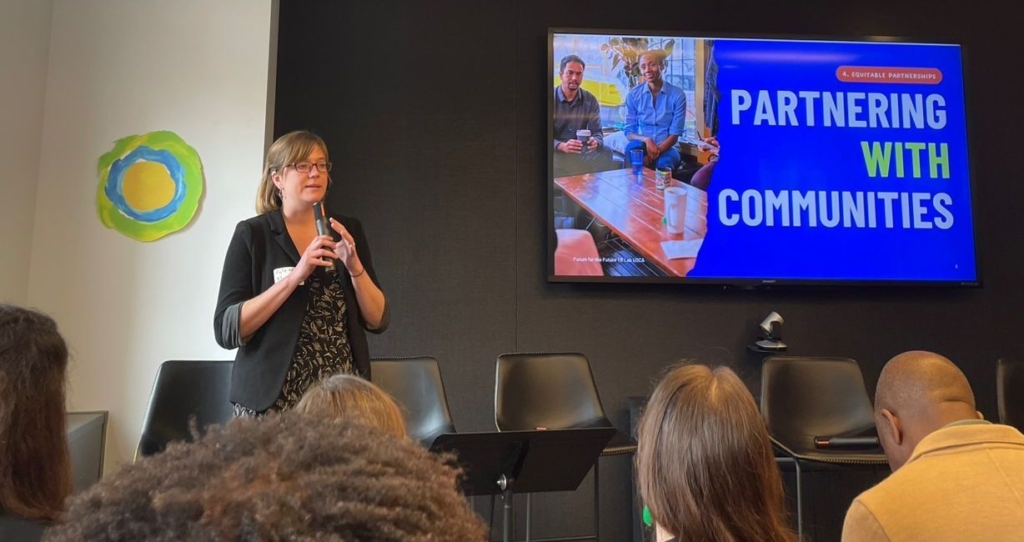
Kylie Nealis, Senior Program Manager for Climate Justice at B Lab US & Canada, presents the section on partnering with communities during our flagship session at Climate Week NYC 2024.
My takeaways from Climate Week NYC 2024 were abundant. They mainly emerged from the two events that B Lab U.S. & Canada hosted in partnership with other organizations and B Corps, but they also emerged during casual, on-the-go conversations and connections. Here are my top ones:
- The time for climate justice has arrived. Now more than ever, the business community is showing widespread interest and openness to advancing climate justice.
- In-person connections are irreplaceable. To advance climate justice, we must bring together the right people at the right time.
- Uncomfortable conversations are necessary. Speaking truth to power is crucial if we are to truly build meaningful partnerships between businesses and communities to drive just and equitable climate action.
- Representation matters. While there are clear signs of progress, there are still many, many people who are not at the tables and in the seats during Climate Week NYC whose voices are critical to conversations about climate change.
- Actionable insights are needed. Beyond big ideas, business leaders need practical strategies to advance climate justice through their existing business models and operations. (The newly released guide, Driving Climate Action Through Your Business Finances, highlighted later in this article is one great example!)
These takeaways reinforce the importance of the B Corp community’s efforts for climate justice, which is one of the three pillars in B Lab U.S. & Canada’s Theory of Change alongside a stakeholder economy and racial equity. At its core, climate justice is the recognition that those who are least responsible for climate change will be affected first and suffer its most devastating impacts. Around the world, these are predominantly People of Color and systematically oppressed communities on the frontlines of climate change. That’s why it’s crucial for the B Corp community to listen to, center, and uplift the voices of people most affected in work to advance climate justice.
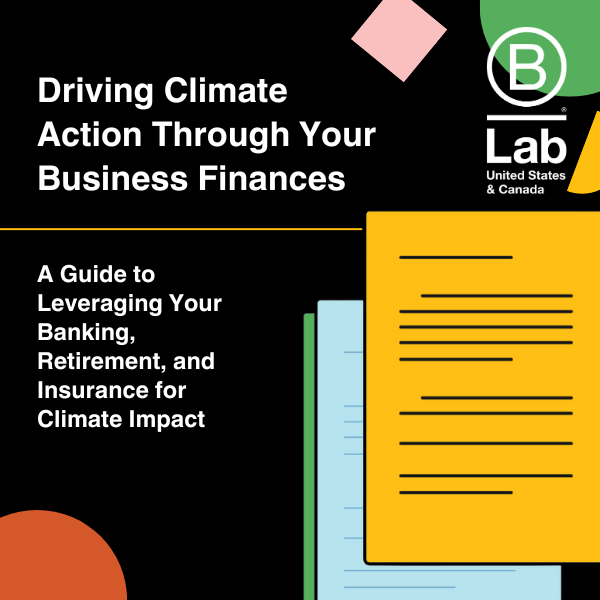
Driving Climate Action Through Your Business Finances
This guide provides resources and guidance to help companies align their financial choices with their organizational values. Get insights and concrete steps to select a financial institution that will help your business advance climate justice.
A Conversation and Resources to Help Businesses and Communities Partner for Climate Justice
Prioritizing the voices of frontline communities was a common thread during my Climate Week NYC conversations and came to the fore at our midweek session, Bridging the Gap: Business and Community Partnerships for Climate Justice. The registration numbers show there is an incredible amount of interest in the topic. More than 225 people registered for the session, with capacity at the venue for only 100, during a week with more than 1,000 events happening.
The session embodied the fact that good climate justice work to bring about real change requires deep collaboration. With Forum for the Future’s American Climate Futures Program and Project Drawdown’s Neighborhood Program, B Lab U.S. & Canada envisioned an event that would share actionable insights around how businesses can advance climate justice. We also wanted to explore the gap that can exist between business action and the deep understanding and equitable, trust-based community partnerships necessary to advance climate justice.
Jothsna Harris from Change Narrative set the scene by inviting everyone in the room into the conversation. “We know that climate week is full of opportunities to learn from leaders, and listen to powerful panels,” Harris said. “But if they don’t intentionally call for our participation, [these events] can leave us feeling like mere bystanders… so we want to start by calling you in.”
Harris asked everyone in the room to take a few minutes to individually reflect on some important questions such as:
How have you partnered with frontline communities to advance climate justice? And for people who haven’t yet, with what communities could you?
She also named some tough but necessary truths for us to consider:
Who isn’t represented in this room? Why are they not able to participate and access these spaces? What challenges are they experiencing that you are not?
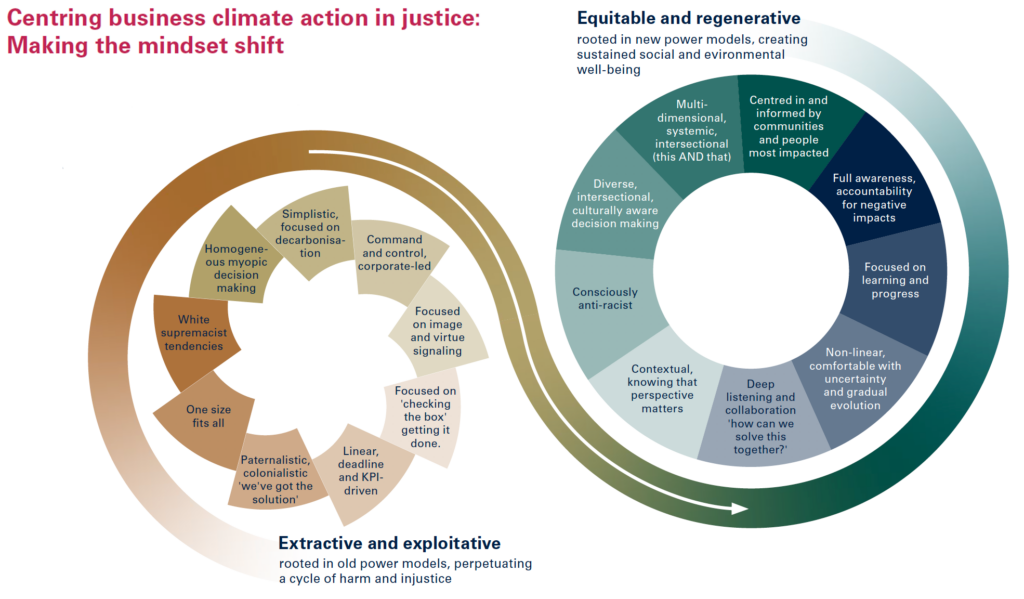
This excerpt from B Lab’s Climate Justice Playbook for Business shows the business mindset shift needed to advance climate justice.
The session highlighted two climate justice resources for business released earlier in 2024:
- The Business Guide to Advancing Climate Justice that B Lab U.S. & Canada co-published with Forum for the Future.
- The Principles for Partnership with Frontline and Impacted Communities developed during a 10-month co-creation process with frontline community and business leaders.
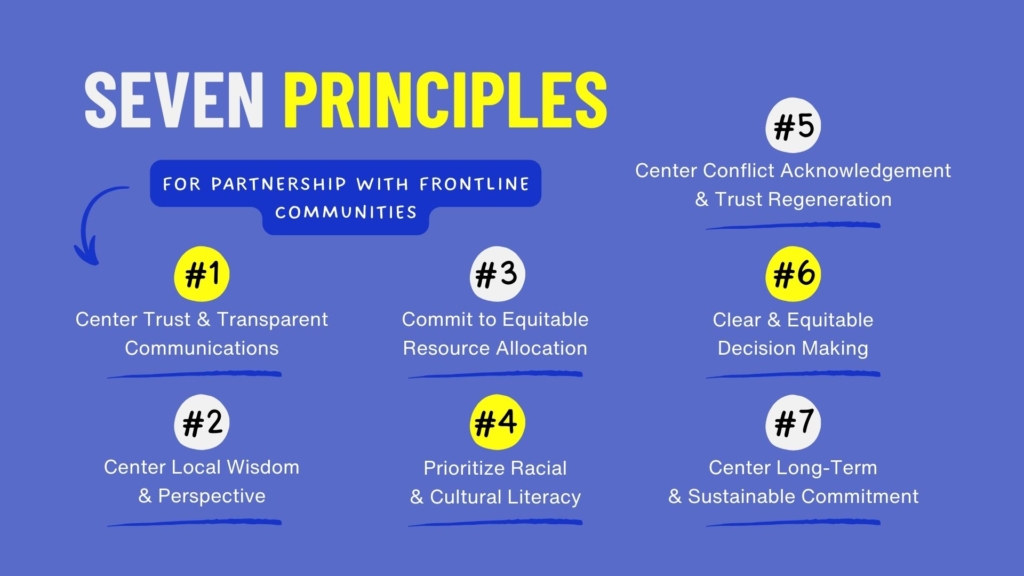
B Lab US & Canada created Seven Principles for Partnership with Frontline & Impacted Communities with frontline community and business leaders.
Guided by Matt Scott, Director of Storytelling at Project Drawdown, we moved into the main event: a rich and honest conversation about community-led climate solutions. During the conversation, these business and community leaders explored what needs to change with how businesses show up and support community-led climate solutions:
- Kate Ogden, Head of Advocacy and Movement Building at Seventh Generation
- Rai-mon Barnes, CEO of Consciously and Chair of B Local NYC
- Kathryn Gioiosa, Co-Executive Director at TREEage
- Nil Zacharias, Founder and CEO at Plantega
- Alex Rodriguez, Environmental Justice Specialist at Save the Sound
Barnes shared a personal anecdote to illustrate the importance of listening for business climate justice work. “Where I grew up, if women were talking, we as kids knew not to interrupt them,” he said. “In the same way, businesses need to arrive first to listen, and then make space to notice, observe, and learn before offering their own climate solutions to communities.”
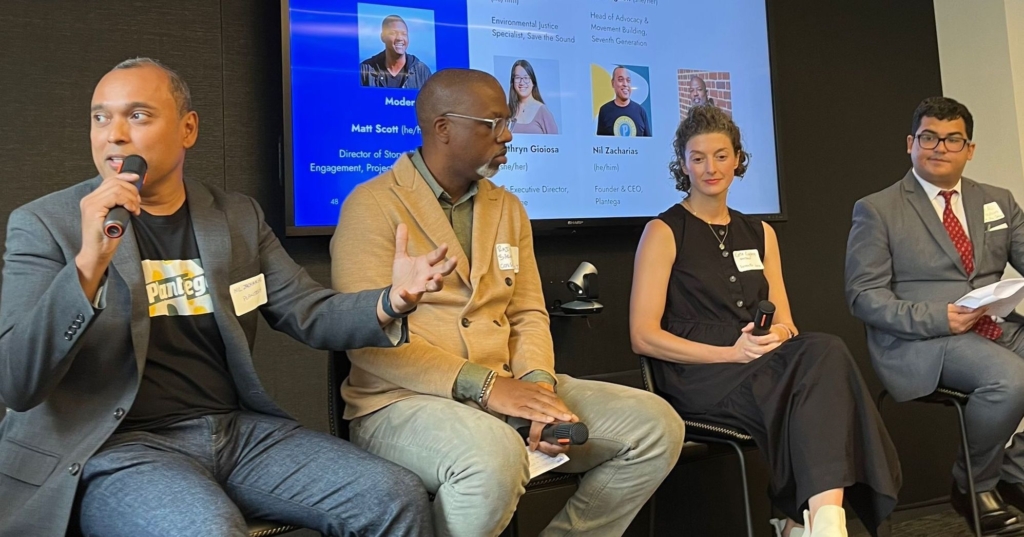
Panelists, from left, Nil Zacharias of Plantega, Rai-mon Barnes of Conciously, Kate Ogden of Seventh Generation, and Alex Rodriguez of Save the Sound.
Tackling Business Climate Finance Over Pizza, Boba Tea, and Visual Storytelling
Our second event, a business climate finance happy hour, was coordinated by Clementina Consens, Senior Associate for Climate Justice at B Lab U.S. & Canada. Her takeaways and highlights follow.
In this space, I witnessed business leaders from varied industries share in community with one another the prickly process of unlearning old business practices and financial habits to drive climate impact. Let’s face it, money can be an uncomfortable topic. At its worst, it’s outright traumatizing, especially when we consider the role of financial systems in perpetuating climate injustice.
By supporting the business climate finance happy hour, I learned how holding space for discomfort can transform how we approach hard topics. What we do (or don’t do) with our money plays a major role in shaping our planet’s future. Climate justice must include the equitable allocation and redistribution of resources, particularly financial ones, to align with the future we envision.
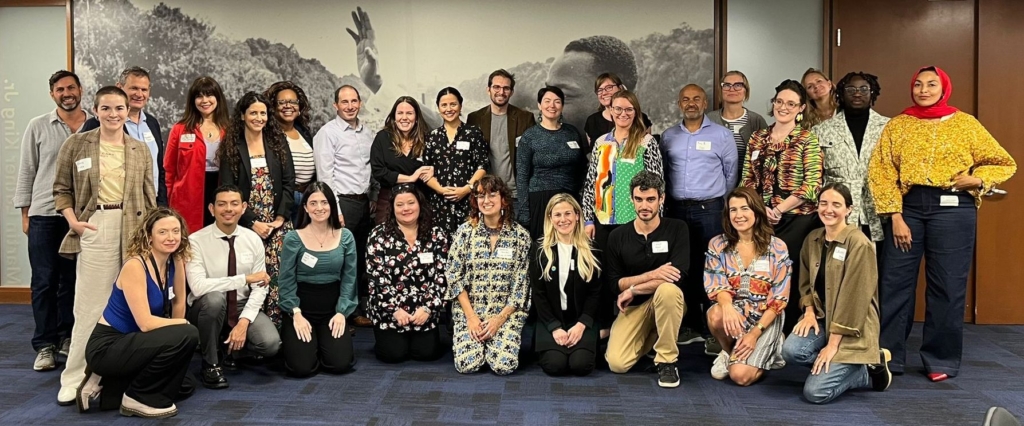
The business climate finance happy hour included business leaders at different stages of their climate-friendly finance journeys.
This gathering included business leaders at different stages of their climate-friendly finance journeys. We shared our challenges and visions around shifting our finances to drive climate action through conversation and visual storytelling over delicious pizza and boba tea. In the middle of a week packed with intense events, panels, and discussions, inviting people to relax with food and drinks, and then to pick up art supplies to draw their biggest financial challenges, might have seemed a strange ask. But it was incredible to witness how doodling and playful scribbles helped surface and communicate stories surrounding finance, footprints, and frustrations with personal and systemic challenges.
As Deanna Bratter, Chief Sustainability Officer at Crocs, said: “You provided me with a welcomed opportunity to take a breath at an exciting and overwhelming Climate Week. A welcome and healthy reprieve to reset, while offering updates on the important and action-oriented work still to be done elevating the role of climate finance across industries.”
By creating spaces like the business climate finance happy hour, we are facilitating the hard, uncomfortable conversations necessary for real change and proving the power of being in the mess together. Bringing the right people together at the right time, in spaces that center humanity and playfulness while building community, allows us to tackle complex issues like climate finance in a way that feels both approachable and deeply transformative.
A Guide to Help Companies Leverage Their Finances for Climate Impact
When our climate justice team began to conceive a business climate finance community of practice in early 2024, they brought together many of the leading financial institutions in the U.S. and Canadian B Corp movement to form a working group. Demonstrating selflessness and a commitment to collection action and systemic change, these leaders dedicated many hours to coach 55 businesses through a 12-week cohort, equipping them with the skills and tools to reshape their banking, retirement, and insurance relationships to be more climate-friendly.
Their efforts also produced the Business Climate Finance Guide, a newly released resource to help B Corps and other businesses address climate and justice through the financial institutions they choose to work with. With both educational resources and actionable guidance from the guide, B Corps can better align their banking, retirement, and insurance choices with their organizational values.
Finance is a crucial lever in curbing the climate crisis. The six largest U.S. banks — JPMorgan Chase, Citi, Wells Fargo, Bank of America, Goldman Sachs, and Morgan Stanley — pumped $1.8 trillion into fossil fuel companies from 2016 to 2023 alone. B Corp banks provide a planet-friendly alternative to the dominant financial players who help the fossil fuel industry maintain its power, influence, and ability to fuel the climate crisis — literally.
Business’s financial practices and partnerships have the potential to either fuel or help curb climate disasters, like the hurricanes that we’ve seen overtake the Southeast U.S. in the past week and a half. Additionally, where businesses choose to invest their money, and whether or not those options are climate-friendly or harmful, impact frontline and local communities that are bearing the brunt of climate impacts. In short, there are clear lines between business climate finance and the climate crisis — and where and how businesses move their money matters.
“We are building a community of practice to empower B Corps to take on the challenging task of moving their money with intention,” said Raj Agarwal, CEO of B Corp Provoc and a strategic advisor to B Lab U.S. & Canada’s Climate Justice Program. “By fostering community and offering diverse ways to find support, we create spaces for refuge from the work. Our opportunity is clear: to provide all that is necessary to stop funding fossil fuels.”
The guide includes:
- Insights and concrete steps to help companies shift their banking, retirement plans/401(k)s, and insurance practices and relationships.
- Change-management processes, from doing internal engagement to obtaining leadership buy-in to engaging external providers.
- Examples from B Corps leading the way.
- A robust resources section featuring partner organizations and experts.
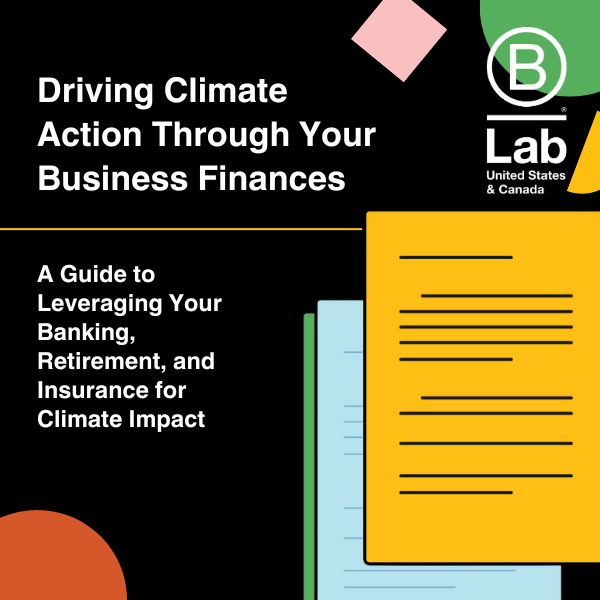
Driving Climate Action Through Your Business Finances
This guide provides resources and guidance to help companies align their financial choices with their organizational values. Get insights and concrete steps to select a financial institution that will help your business advance climate justice.
As we continue to reflect on Climate Week NYC, it’s clear that B Corps are not just a movement of businesses as a force for good; they also have the potential to be a vital player in the fight for climate justice. This is especially true in the wake of the recent destruction brought by Hurricanes Helene and Milton. The discussions, innovations, and collaborations showcased during Climate Week NYC, just days before these climate crises unfolded, highlighted the urgent need for all companies to embrace practices that benefit both people and the planet. They also surface some uncomfortable truths, questions, and realities around who is at the table and who isn’t, and who has access to spaces like Climate Week and who does not, and how businesses can meaningfully support frontline and impacted communities, not only during climate crises but through lasting, equitable partnerships. We must continue to ask ourselves these questions if we are to succeed in building inclusive spaces and opportunities for conversations and actions toward advancing climate justice.
Now more than ever, it’s imperative that we harness this momentum to drive meaningful change through both individual and collective action. What we saw, heard, and felt in the event spaces that we agreed to this week was an eagerness, openness, and commitment from businesses to step up, take responsibility, and contribute to advancing climate justice in meaningful, innovative, and lasting ways.
Learn more about B Lab U.S. & Canada’s climate justice work:
• Climate Justice Program Overview
Sign Up for our B The Change Newsletter
Read stories on the B Corp Movement and people using business as a force for good. The B The Change Newsletter is sent weekly.
